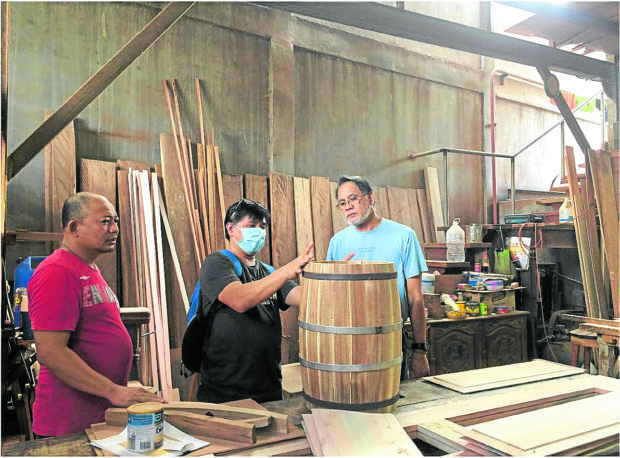Roll out the (cheaper) barrel: DOST offers PH winemakers an option
MANILA, Philippines — Oak barrels are the best, but local makers of tropical fruit wines may soon get quality yet affordable alternatives to give the wine industry the needed boost.
The Department of Science and Technology-Forest Products Research and Development Institute (DOST-FPRDI) is pilot-testing wine barrels made from the local plantation tree species big-leaf mahogany (Swietenia macrophylla), mangium (Acacia mangium), and river red gum (Eucalyptus camaldulensis), as well as wood from the fruit trees santol (Sandoricum koijape) and Indian mango (Mangifera indica).
The barrels were developed by DOST-FPRDI researchers to find less expensive substitutes for white oak (Quercus alba), which is known worldwide as the best traditional material for fermenting and aging wine.
White oak trees don’t grow in the Philippines, driving certain brewers to import oak barrels at prices ranging from $1,000 to $2,000 each, exclusive of shipping costs.
Most local makers of fruit wine use plastic and glass containers for their products, according to the wine barrel technology (WBT) project leader, engineer Caezar Cuaresma. As inert containers, however, these do not add desirable flavors and aromas to the wine being aged.

ALTERNATIVE TO OAK The team behind the DOST wine barrel technology project checks a prototype at a woodworks shop in Sta. Rosa, Laguna. —DOST-FPRDI PHOTO
Moderately acceptable
“[With] our WBT, they can have access to a quality but affordable option. It’s almost like they’re using imported barrels but at a lesser cost—about three times cheaper,” Cuaresma said.
Article continues after this advertisementThe team’s partner-fabricator, Angeles Woodworks Co. in Sta. Rosa City, Laguna province, has made sample barrels that are an enhanced version of the original.
Article continues after this advertisementStudies on the use of local trees as a source of wood barrel date back to 2013.
The DOST-FPRDI barrels have been certified safe by the WBT team on the basis of positive lab results.
The wines aged in the local wooden barrels have been rated “moderately acceptable” by expert tasters who based their assessments on color, bitterness, sweetness, clarity, flavor, aftertaste and general acceptability.
Cuaresma said a number of large distilleries and wineries had signified interest in the WBT. “To meet their needs, we are planning to do further studies for upscaling the barrels’ capacities,” he said.
Tuba, etc.
The WBT does not contribute to deforestation as it uses only wood from trees planted in large plantations and old, unproductive fruit trees, Cuaresma pointed out, adding that the local trees were not among the 984 species in the Department of Environment and Natural Resources’ national list of threatened Philippine plants.
The Philippines produces and exports wines fermented from palm sap (tuba), rice (tapuy), and sugarcane (basi), as well as local fruits such as bignay berries, guyabano, mangosteen, duhat and mango.
Wine consumption among Filipinos remains small, compared with other alcoholic drinks.
According to the 2018 Global Agricultural Information Network (GAIN) of the US Department of Agriculture-Foreign Agricultural Service, wine comprises less than 1 percent of the estimated 2.5 billion liters of alcoholic beverages consumed annually in the Philippines.
Wine, which is generally more expensive, is topped by gin (of which Filipinos are the world’s biggest consumers) and beer—both considered street drinks.
But wine imports have grown. Per the GAIN report, the volume of the Philippines’ wine importation from the United States will rise by 10.25 percent to 4.3 million L, while the import bill is expected to expand by 12.06 percent to $13 million.